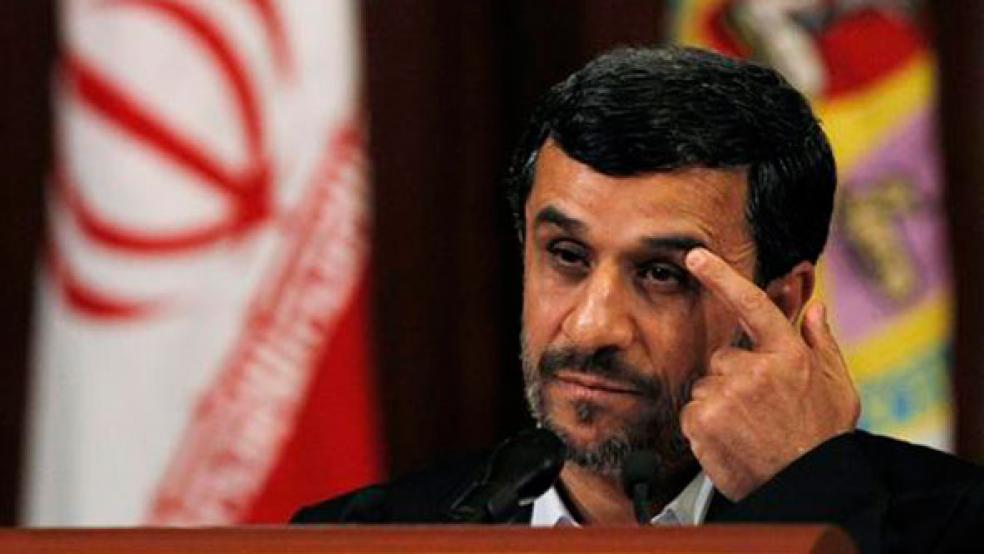As tensions over Iran's nuclear program ratchet higher once again, Supreme Leader Ayatollah Ali Khamenei's aversion for the West remains a formidable barrier to any diplomatic solution. A visit by U.N. nuclear inspectors to Iran this week, a few days after Tehran wrote to European Union foreign policy chief Catherine Ashton promising "new initiatives" in negotiations, suggests the door to diplomacy has not slammed shut.
Harsher Western sanctions are damaging Iran's economy and Israel is debating military action, with or without a U.S. green light, lending fresh urgency to efforts to defuse the crisis over the Islamic Republic's sensitive nuclear activity. Yet a sea change in policy seems unlikely while the tall, bearded Khamenei, 72, holds power in a country whose Shi'ite Muslim religious leadership has made "Death to America, death to Israel" its mantra since the 1979 Islamic revolution.
RELATED: Unthinkable: Conflict Between Iran and Israel
This month Khamenei said sanctions would not alter Iran's nuclear course, military threats would "harm America" and any nation or group fighting Israel, thought to be the Middle East's only nuclear-armed power, would have Tehran's backing. "In response to threats of oil embargo and war, we have our own threats to impose at the right time," he declared.
Khamenei has in the past denied that Iran seeks atomic bombs, saying: "It is against our Islamic thoughts." But he has shown little interest in genuinely assuaging Western worries about Iran's activities, authorizing what the U.N. nuclear watchdog regards as only incomplete cooperation, as well as intermittent talks with six world powers that Western officials suspect Tehran pursues primarily to gain more time to attain nuclear "breakout" capability.
The bespectacled cleric, who ultimately decides all matters of state, including nuclear and foreign policy, simply does not trust the United States, once described by his late mentor Ayatollah Ruhollah Khomeini as a wolf to Iran's lamb.
In 2009, when President Mahmoud Ahmadinejad, himself no friend of the West, leaned toward a compromise involving a nuclear fuel swap to allay concerns about Iran's intentions, hardliners shot it down, apparently with Khamenei's blessing.
WARY OF RIVALS
Khamenei has long sought to ensure that no group, even among his conservative allies, musters enough power to challenge him. And when Ahmadinejad appeared to do just that last year, Khamenei was swift to react, reinstating an intelligence minister sacked by the president against his will.
Iranian analysts say the Supreme Leader is keen to ensure that Ahmadinejad emerges weaker from next week's parliamentary election, expected to be mostly a contest among hardliners.
After Khomeini died in 1989, Khamenei, who served two terms as president in the 1980s, was picked to succeed him, a surprise choice for some, as he was then only a mid-ranking cleric. He was swiftly promoted to ayatollah.
Khamenei inherited enormous powers, but could not hope to emulate the towering political and religious authority of Iran's revolutionary founder. His allies say he tends to reach major decisions after consulting a tight-knit group of top officials. He can count on the loyalty of the elite Revolutionary Guards and Basij religious militia, which quelled the worst unrest in the Islamic Republic's history after Ahmadinejad was re-elected in June 2009 in a vote opponents said was rigged.
TAKING SIDES
Khamenei then cast his weight behind Ahmadinejad, declaring that defeated opposition leaders would be responsible for any bloodshed in what proved to be eight months of street protests. Soon after the election, Khamenei, the final authority in Iran's complex system of clerical rule and limited democracy, appeared to offer his own life for the Islamic revolution in an emotional Friday sermon that drew tears from the congregation.
"We will do what we will have to do," he said. "I have an unworthy life, a defective body and little honor, which was given to me by you. I will put all of these on the palm of my hand and spend them on the path of the revolution and Islam." The message of the Supreme Leader, whose right hand was crippled in a 1981 assassination attempt, was that defiance of his will amounted to a counter-revolutionary act.
Khamenei should stay above the political fray, according to Khomeini's system of "velayat-e faqih", or rule by a religious jurist. His one-sided intervention in the uproar after the 2009 vote, which divided Iran's religious and political elite, further stoked a crisis of legitimacy that still lingers.
In practice, Khamenei has long favored hardliners, helping to thwart reforms and feelers toward the United States when the moderate Mohammad Khatami was president from 1997 to 2005, and for years backing his radical successor, Ahmadinejad. In theory, he could be removed by the 86-man Assembly of Experts, but the clerical body is never known to have challenged a man who controls many of the levers of power.
Khamenei, whose black turban signifies he is a descendant of the Prophet Mohammad, is commander-in-chief of the armed forces and appoints many senior figures, including the heads of the judiciary, security agencies and state radio and television.
Born into a clerical family in Mashhad in northeast Iran in 1939, he became involved with underground groups opposed to the U.S.-backed Shah in the 1960s and was jailed several times. In a study of Khamenei's writings, Karim Sadjadpour of the Carnegie Endowment argued that his hostility to U.S. "global arrogance" was matched by fear that any opening to the West would allow foreign influences to dilute Iran's Islamic purity.
"After three decades of being immersed in a 'death to America' culture, it may be asking too much for Khamenei to reinvent himself," Sadjadpour wrote.




